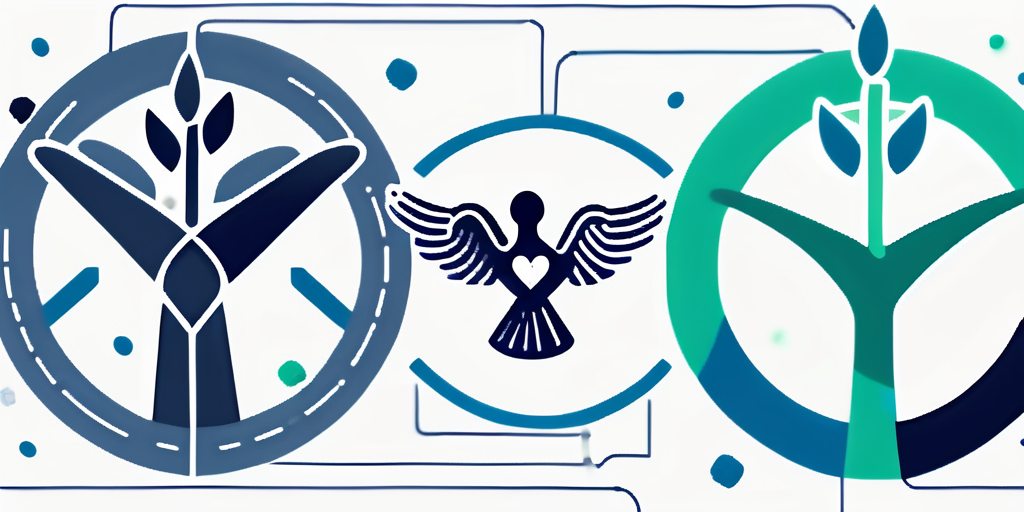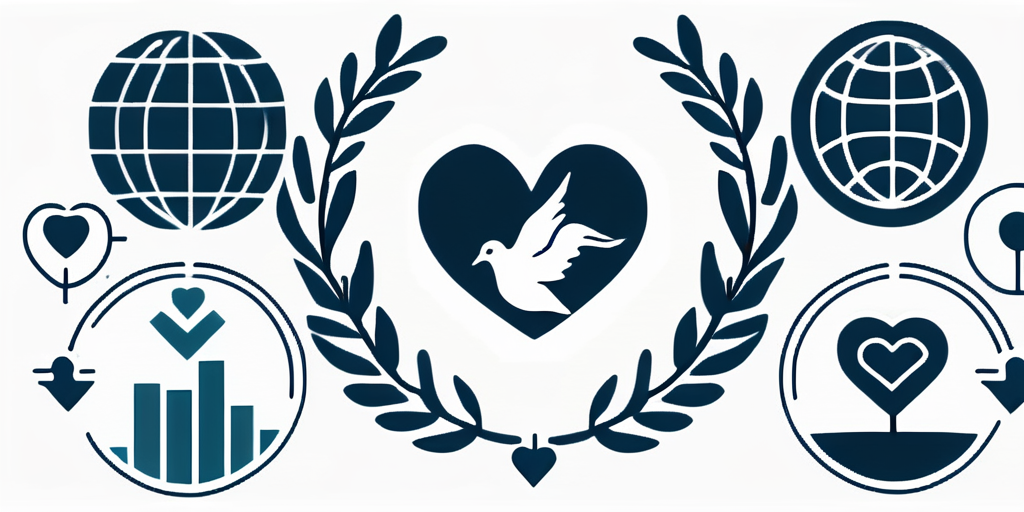The Best Database for Nonprofit Organizations: A Comprehensive Guide

In today’s digital age, nonprofit organizations need efficient and reliable database management systems to streamline their operations and enhance their fundraising efforts. A well-designed database can provide a plethora of benefits, from simplifying data entry to improving communication and donor relations. In this comprehensive guide, we will explore the importance of a database for nonprofit organizations, key features to look for in a nonprofit database, top options available in the market, and best practices for implementing and maintaining your chosen database.
Understanding the Importance of a Database for Nonprofit Organizations
Nonprofit organizations often handle large amounts of data, including donor information, volunteer details, and program statistics. Without a centralized database, managing this information can become overwhelming and time-consuming. A robust database allows nonprofits to efficiently collect, organize, and access data, enabling them to make informed decisions and better serve their constituents.
Streamlining Operations with a Database
One of the primary benefits of a nonprofit database is its ability to streamline operations. By automating manual processes and centralizing data, organizations can reduce administrative overhead, minimize errors, and increase staff productivity. A well-designed database simplifies tasks like data entry, communication tracking, and event management, freeing up valuable time for staff members to focus on their core responsibilities.
For example, imagine a nonprofit organization that relies heavily on volunteers to carry out its mission. With a database in place, the organization can easily track volunteer availability, skills, and preferences. This information can then be used to efficiently assign volunteers to appropriate tasks and ensure that the right people are in the right place at the right time. By streamlining the volunteer management process, the organization can maximize the impact of its volunteers and deliver services more effectively.
Enhancing Fundraising Efforts through Database Management
A database can dramatically improve a nonprofit organization’s fundraising efforts. By storing information about donors, their giving history, and their preferences, nonprofits can target their fundraising campaigns more effectively. Personalized communications tailored to individual donors’ interests and giving patterns can significantly increase donor engagement and loyalty. Moreover, a comprehensive database enables nonprofits to generate meaningful reports and analytics, helping them identify trends, measure the success of their campaigns, and make data-driven decisions to optimize their fundraising strategies.
For instance, let’s consider a nonprofit organization that is planning a major fundraising event. With a database, the organization can easily track past event attendance, donor contributions, and event preferences. Armed with this information, the organization can tailor its event invitations and marketing materials to appeal to specific donor segments. By personalizing the messaging and highlighting the aspects of the event that resonate most with each donor, the organization can increase the likelihood of their attendance and support. This targeted approach not only enhances the organization’s fundraising efforts but also strengthens the relationships with its donors.
Key Features to Look for in a Nonprofit Database
When choosing a database for your nonprofit organization, several key features are essential to consider. These features ensure that your database is user-friendly, customizable, and secure.
User-Friendly Interface
A user-friendly interface is crucial as it enables staff members with varying levels of technical expertise to navigate and operate the database easily. Look for intuitive design, clear labeling, and easy-to-use features such as drag-and-drop functionality and customizable dashboards. A user-friendly interface ensures that your staff can maximize productivity and efficiency while using the database.
Customizable Reporting
Customizable reporting capabilities are essential for nonprofit organizations to generate tailored reports that meet specific requirements. Ensure that your database allows you to create customized reports with the ability to choose data fields, apply filters, and format layouts. Customizable reports enable nonprofits to track relevant metrics and analyze data in a way that aligns with their unique goals and objectives.
Robust Security Measures
Given the sensitive nature of donor and organizational data, it is crucial to prioritize security when selecting a nonprofit database. Look for a database that offers robust security measures, such as user permissions, encryption, and regular data backups. Protecting your organization’s and donors’ data is paramount to maintaining trust and ensuring compliance with data protection regulations.
Additionally, another important feature to consider when choosing a nonprofit database is integration capabilities. Integration allows your database to seamlessly connect with other software and tools that your organization uses. This can include email marketing platforms, fundraising software, or volunteer management systems. By having an integrated database, you can streamline your operations and avoid the need for manual data entry or duplicate records.
Furthermore, scalability is a crucial factor to consider. As your nonprofit organization grows and expands its reach, your database needs to be able to accommodate the increasing volume of data and users. Look for a database that offers scalability options, such as the ability to add more storage space or upgrade to a higher-tier plan without disrupting your operations. This ensures that your database can grow alongside your organization, saving you time and resources in the long run.
In conclusion, when choosing a nonprofit database, it is important to consider not only the user-friendly interface, customizable reporting, and robust security measures but also integration capabilities and scalability. By selecting a database that meets these criteria, your organization can effectively manage its data, streamline operations, and make informed decisions to further its mission.
Top Database Options for Nonprofit Organizations
Several reputable database options cater specifically to the unique needs of nonprofit organizations. These options offer a range of features and pricing plans, making it essential to evaluate them based on your organization’s requirements and budget.
Nonprofit organizations rely heavily on databases to manage donor information, track fundraising efforts, and streamline operations. Choosing the right database solution can significantly impact the efficiency and effectiveness of your organization’s mission-driven work. It’s crucial to consider factors such as ease of use, data security, scalability, and integration capabilities when selecting a database platform.
Overview of Leading Nonprofit Databases
One popular nonprofit database option is ABC Nonprofit Database, known for its user-friendly interface and comprehensive donor management features. XYZ Nonprofit System is another well-regarded choice, offering robust reporting capabilities and secure data storage. Nonprofit Manager Pro is a customizable database known for its scalability and integration with other nonprofit management tools. Each option provides specific benefits, so assess your organization’s needs thoroughly before making a decision.
Furthermore, beyond donor management, many nonprofit databases offer additional features such as volunteer tracking, event management, and grant application assistance. These tools can help streamline various aspects of nonprofit operations, allowing organizations to focus more on their core mission and less on administrative tasks.
Comparing Pricing and Features
When evaluating nonprofit databases, consider not only the features they offer but also the pricing plans available. Some providers offer tiered pricing based on the size of the organization or the number of users. Take into account your budget and long-term sustainability when assessing the value and cost of each option. It may also be helpful to request demos or trial periods to ensure compatibility with your organization’s workflow.
Additionally, consider the level of customer support and training provided by each database vendor. A user-friendly interface is essential, but ongoing support and resources can make a significant difference in how effectively your team can utilize the database to its full potential. Look for vendors that offer comprehensive training materials, responsive customer service, and a dedicated account manager to assist with any technical issues or questions that may arise.
Implementing Your Chosen Nonprofit Database
Once you have selected the best nonprofit database for your organization, a successful implementation is crucial to capitalize on its potential benefits.
Preparing Your Organization for the Transition
Before implementing a new database, ensure that your organization is adequately prepared for the transition. This includes data cleansing, data migration, and staff training. Review your current data for accuracy and completeness, removing duplicates and outdated information. Plan and execute a smooth data migration process, ensuring that all necessary data is transferred accurately to the new database. Lastly, provide comprehensive training to your staff members on how to navigate and utilize the database effectively.
Training Staff on the New Database
Investing time and resources in training your staff on the new nonprofit database is crucial for its successful adoption. Offer comprehensive training sessions and provide user guides or tutorial materials for reference. Encourage staff members to ask questions and seek ongoing support from the database provider. Empowering your team with the necessary knowledge and tools will foster confidence and optimize database utilization.
Maintaining and Updating Your Nonprofit Database
Implementing a nonprofit database is not a one-time task; it requires regular maintenance and updates to ensure its relevance and accuracy.
Regular Database Audits
Performing regular audits of your database ensures data integrity and helps identify and rectify any inconsistencies or errors. Set a schedule for database audits and review data entries, records, and reports to identify and correct any discrepancies. Conducting periodic audits ensures that your organization can trust the data stored in the database and make informed decisions based on accurate information.
Keeping Your Database Up-to-Date
To maximize the effectiveness of your nonprofit database, ensure that you keep it up-to-date with the most recent information. Regularly enter new data, update existing records, and remove outdated or irrelevant information. Encourage staff members to document interactions and updates promptly, ensuring the accuracy and completeness of donor and organizational records. By keeping your database up-to-date, you ensure that your organization has access to reliable and current information for informed decision-making.
By understanding the importance of a database, evaluating key features, selecting the best option, and implementing it effectively, nonprofit organizations can unlock opportunities for efficiency, growth, and success. Regular maintenance and updates ensure the continued relevance and reliability of the database, enabling organizations to make data-driven decisions and build stronger relationships with their donors and stakeholders. Embrace the power of a well-designed database and pave the way for a more impactful nonprofit organization.
As you seek to enhance your nonprofit’s efficiency and impact with the right database, don’t overlook the power of a strong digital presence. BlueWing is dedicated to helping organizations like yours harness the potential of paid social media and search to grow sustainably. Our expertise in managing nonprofit paid media campaigns, coupled with our success in utilizing the Google Ad Grants program, positions us as the ideal partner to amplify your impact. Ready to take your nonprofit to new heights? Contact us today and let’s build a brighter future together.





